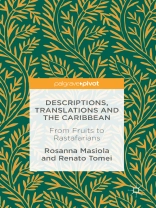This book offers a new perspective on the role played by colonial descriptions and translation of Caribbean plants in representations of Caribbean culture. Through thorough examination of Caribbean phytonyms in lexicography, colonization, history, songs and translation studies, the authors argue that the Westernisation of vernacular phytonyms, while systematizing the nomenclature, blurred and erased the cultural tradition of Caribbean plants and medicinal herbs. Means of transmission and preservation of this oral culture was in the plantation songs and herb vendor songs. Musical creativity is a powerful form of resistance, as in the case of Reggae music and the rise of Rastafarians, and Bob Marley’s ‘untranslatable’ lyrics. This book will be of interest to scholars of Caribbean studies and to linguists interested in pushing the current Eurocentric boundaries of translation studies.
İçerik tablosu
Chapter 1: Paradise Lost in Translation.- Chapter 2: Multilingual phytonymy: eco-translation and vernaculars.- Chapter 3: Songs and the Caribbean: invention and adaptation.- Chapter 4: Language Redemption: Bob Marley in Translation.
Yazar hakkında
Rosanna Masiola is Professor of English and Translation at the University for Foreigners of Perugia, Italy. Masiola is the author of twenty monographs, as well as edited works including
West of Eden: Botanical Discourse Contact Languages and Translation (2009) and
Law Language and Translation: From Concepts to Conflicts (2015), both with Renato Tomei.
Renato Tomei is Assistant Professor of English and Translation at the University for Foreigners of Perugia, Italy. He holds a Ph D in Linguistics from the University of Addis Ababa, Ethiopia. Tomei is author of
Jamaican Speech Forms in Ethiopia (2015), and co-author of
Advertising Culture and Translation: From Commonwealth to Global (forthcoming).












